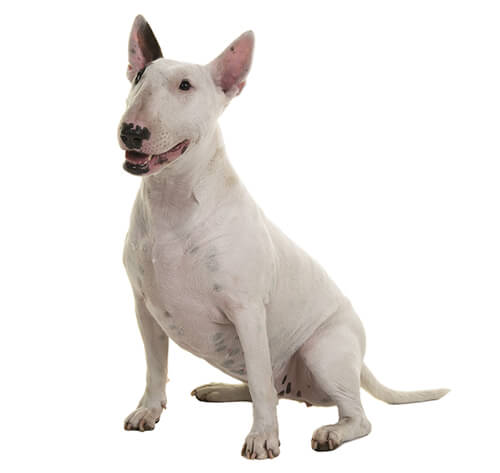
Bull Terrier
First bred in 19th-century England, the Bull Terrier is the clown of dogs. Robust and spirited, this playful, fun-loving breed is always ready for a frolic. He loves children, but obedience training is necessary and care must be taken that he does not get overstimulated around younger children. Friendly and affectionate, Bull Terriers thrive on human companionship. This active, well-muscled breed needs daily exercise and has a low-maintenance coat.
DID YOU KNOW? President Theodore Roosevelt owned a Bull Terrier named “Pete.”
ALSO KNOWN AS: Bully, Gladiator, English Bull Terrier
The need-to-know
- Dog suitable for experienced owners
- Extra training required
- Enjoys active walks
- Enjoys walking an hour a day
- Medium dog
- Minimum drool
- Requires grooming once a week
- Non hypoallergenic breed
- Quiet dog
- Guard dog. Barks and alerts
- May require training to live with other pets
- Great family dog
Personality

Bull Terriers are friendly dogs with a seemingly wonderful sense of humour. They can be obstinate and are not ideal dogs for the first-time owner. As a breed they are generally placid, but it has to be remembered that they were originally bred as fighting dogs and will react if challenged, but they will not normally make the first move. They are very affectionate dogs and love company, so it is not a good idea to leave them alone for long periods of time as with their strong jaws they can cause lots of damage if bored.
History and Origins

Bred by crossing a bulldog with a terrier, this dog was produced to fight to the death in the bloody sport of bull baiting. They are now one of the most popular dogs in Britain, and have proved to be an impeccable guard dog. The Miniature Bull Terrier breed has existed for as long as the Standard, and was recognised as a separate breed by the British Kennel Club in 1939.
Nutrition and Feeding

Your dog's diet needs to have the right balance of all the main nutrient groups including a constant supply of fresh water. It's also important to conduct regular body condition scores to ensure you keep your dog in ideal shape and remember to feed him at least twice daily and in accordance with the feeding guidelines of his particular food.
Exercise

Bull Terriers are an active breed that require a fair amount of exercise, both free running and roadwork. An hour's daily exercise should be considered a minimum, though this breed will happily accept more!
Other Information

Health and common issues
Deafness is the most common health problem within the breed, most frequently encountered in white Bull Terriers. Dogs can be tested for deafness from a young age. Inherited kidney problems, and heart problems can occur, and skin disorders arise relatively frequently.
Best family dog breeds
While many dogs are traditionally thought of as being good with children , all dogs and children need to be taught to get on with and respect each other, and be safe together. Even so, dogs and young children should never be left alone together and adults should supervise all interactions between them.